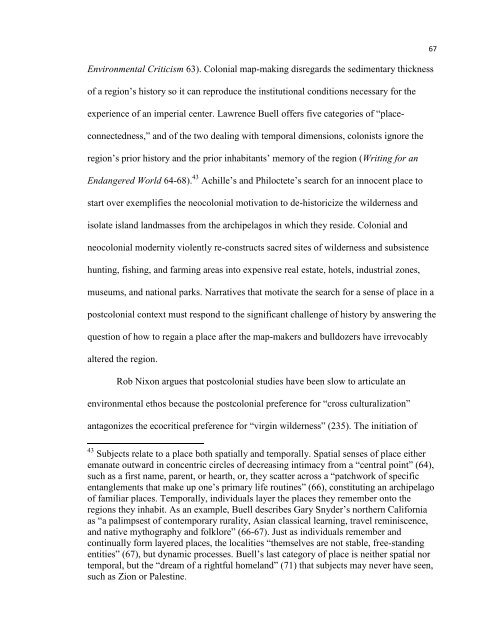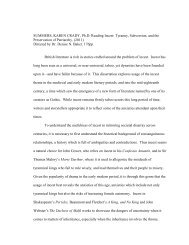RE-INHABITING THE ISLANDS - The University of North Carolina at ...
RE-INHABITING THE ISLANDS - The University of North Carolina at ...
RE-INHABITING THE ISLANDS - The University of North Carolina at ...
Create successful ePaper yourself
Turn your PDF publications into a flip-book with our unique Google optimized e-Paper software.
Environmental Criticism 63). Colonial map-making disregards the sedimentary thickness<br />
<strong>of</strong> a region‘s history so it can reproduce the institutional conditions necessary for the<br />
experience <strong>of</strong> an imperial center. Lawrence Buell <strong>of</strong>fers five c<strong>at</strong>egories <strong>of</strong> ―placeconnectedness,‖<br />
and <strong>of</strong> the two dealing with temporal dimensions, colonists ignore the<br />
region‘s prior history and the prior inhabitants‘ memory <strong>of</strong> the region (Writing for an<br />
Endangered World 64-68). 43 Achille‘s and Philoctete‘s search for an innocent place to<br />
start over exemplifies the neocolonial motiv<strong>at</strong>ion to de-historicize the wilderness and<br />
isol<strong>at</strong>e island landmasses from the archipelagos in which they reside. Colonial and<br />
neocolonial modernity violently re-constructs sacred sites <strong>of</strong> wilderness and subsistence<br />
hunting, fishing, and farming areas into expensive real est<strong>at</strong>e, hotels, industrial zones,<br />
museums, and n<strong>at</strong>ional parks. Narr<strong>at</strong>ives th<strong>at</strong> motiv<strong>at</strong>e the search for a sense <strong>of</strong> place in a<br />
postcolonial context must respond to the significant challenge <strong>of</strong> history by answering the<br />
question <strong>of</strong> how to regain a place after the map-makers and bulldozers have irrevocably<br />
altered the region.<br />
Rob Nixon argues th<strong>at</strong> postcolonial studies have been slow to articul<strong>at</strong>e an<br />
environmental ethos because the postcolonial preference for ―cross culturaliz<strong>at</strong>ion‖<br />
antagonizes the ecocritical preference for ―virgin wilderness‖ (235). <strong>The</strong> initi<strong>at</strong>ion <strong>of</strong><br />
67<br />
43 Subjects rel<strong>at</strong>e to a place both sp<strong>at</strong>ially and temporally. Sp<strong>at</strong>ial senses <strong>of</strong> place either<br />
eman<strong>at</strong>e outward in concentric circles <strong>of</strong> decreasing intimacy from a ―central point‖ (64),<br />
such as a first name, parent, or hearth, or, they sc<strong>at</strong>ter across a ―p<strong>at</strong>chwork <strong>of</strong> specific<br />
entanglements th<strong>at</strong> make up one‘s primary life routines‖ (66), constituting an archipelago<br />
<strong>of</strong> familiar places. Temporally, individuals layer the places they remember onto the<br />
regions they inhabit. As an example, Buell describes Gary Snyder‘s northern California<br />
as ―a palimpsest <strong>of</strong> contemporary rurality, Asian classical learning, travel reminiscence,<br />
and n<strong>at</strong>ive mythography and folklore‖ (66-67). Just as individuals remember and<br />
continually form layered places, the localities ―themselves are not stable, free-standing<br />
entities‖ (67), but dynamic processes. Buell‘s last c<strong>at</strong>egory <strong>of</strong> place is neither sp<strong>at</strong>ial nor<br />
temporal, but the ―dream <strong>of</strong> a rightful homeland‖ (71) th<strong>at</strong> subjects may never have seen,<br />
such as Zion or Palestine.
















